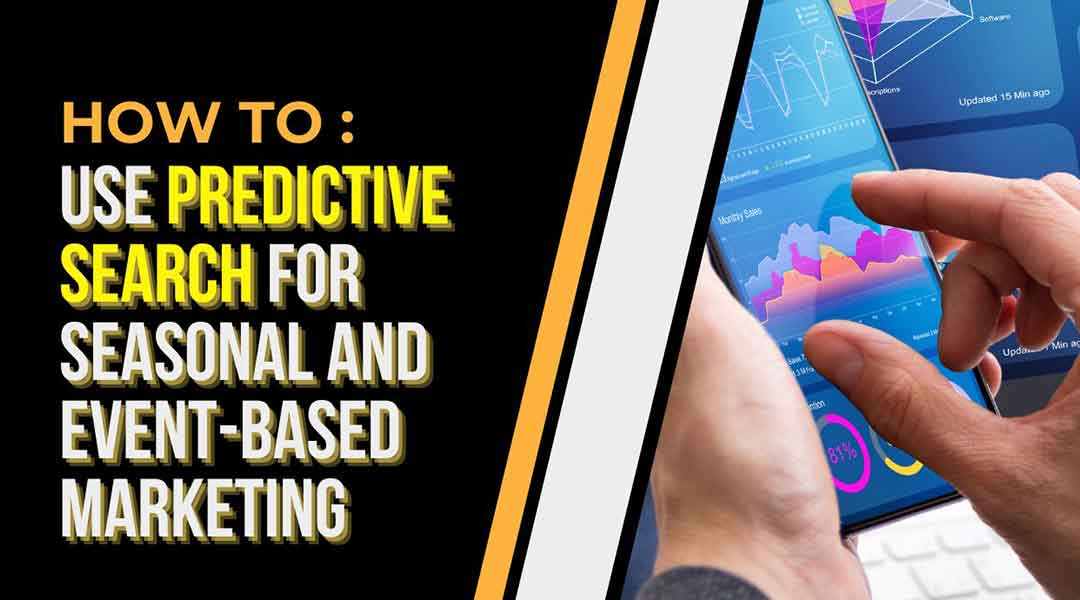Recurring events and seasons can provide fantastic opportunities for businesses to boost commercial performance and create meaningful engagement with a wider repeat audience.
The opportunities to immerse yourself in organic seasonal marketing campaigns around localized exhibitions and pop stores to vast music festivals and industry-leading shows should not be overlooked.
Selecting the right keywords for performance marketing campaigns during seasonal highs is a challenge. With tons of competition, prices can surge to unsustainable levels. Plus, the high cost of SEO campaigns might be harder to justify when there’s a lower return on investment.
Instead of relying solely on a manual approach, businesses can use predictive search to prepare for seasonal events and optimize campaigns accordingly. Predictive search enables marketing professionals to develop hypotheses and generate relevant keywords ahead of a seasonal peak.
Using predictive search, marketers can identify seasonal trends, build up keyword lists before the seasonal period begins, and set marketing strategies that reflect these trends. This enables marketers to reduce their overall spending while still achieving maximum reach and performance.
How Predictive Search Can Be Used for Seasonal Marketing?
Predictive search can help you accurately anticipate the demand for seasonal products or services by analyzing historical data, identifying trends, and uncovering new customers.
By understanding what customers are searching for, you can create a seasonal marketing campaign that is both cost-efficient and tailored to their needs. With predictive search, you can quickly identify the right keywords to target that are relevant to seasonal opportunities, as well as which platforms are best for reaching your target audience.
Moreover, predictive search can enable you to optimize campaigns in real time during the season to ensure maximum efficiency and performance. With this analytical insight, you can adjust your campaigns to meet changing customer needs and ensure that you are always in control of your budget.
Let’s say you’re an apparel retailer preparing for Black Friday and Cyber Monday. Using predictive search, you can identify the keywords related to those days that have the highest volumes of traffic, allowing you to reach a larger audience and maximize your return on investment.
Now, this is just an example of how you can use Google’s predictive search to prepare for seasonal events and optimize campaigns accordingly.
You can also use AI SEO tools to identify new opportunities, discover untapped keywords and create powerful seasonal campaigns that drive traffic to your website.
Whatever the season or event, leveraging predictive search can help you identify the right opportunities to optimize campaigns and maximize performance.
Servicing Consumer Intent Thoroughly
It’s important to remember that seasonal and event-based marketing campaigns should be focused on servicing consumer intent thoroughly. You need to gain visibility for every dominant intent area surrounding your event within the major search engines.
The best approach is to start by researching consumer intent data from keyword and competitor analysis, as well as identifying larger trends that could indicate the potential for seasonal spikes in demand. Gathering this data will help you optimize campaigns for maximum effectiveness and ensure that you are targeting the right audience with the right message.
One of the easiest ways to gather this data is the Google search results and predictive search. By researching the query intents in Google’s predictive search box, you can quickly identify relevant and popular topics to target in your campaigns.
For instance, if you are running a holiday campaign, let’s say thanksgiving, you can look into the predictive search results and see what people are searching for.
Using an AI SEO tool will cut out the time it takes to select the right keywords and topics, saving you countless hours of manual research while still giving you a comprehensive overview of the market.
You can use these keywords and topic ideas and feed them into marketing tools, such as Semrush, to populate your campaigns, quickly monitor progress, and measure success.
Targetting In-SERP Organic Visibility
Now that you have a clear understanding of which keywords and topics to target, it’s time to focus on organic visibility. You can use a range of techniques to ensure that your website is reaching the intended audience and gaining maximum visibility in the SERPs.
For example, you can take advantage of micro-moments, targeting pre-click-rich results and mixed search result opportunities in Google. Optimizing featured snippets and knowledge panels can help you get more real estate in the SERPs and drive organic search visibility.
By focusing on organic visibility, you can ensure that your campaigns are reaching the right people at the right time.
Mastering the Local Landscape
Local SEO is also key when it comes to seasonal and event-based campaigns. It’s a common thread throughout all recurring events and seasonal or pop-up stores’ SEO strategies.
All mobile search is filtered through the locality, so it’s important to implement local SEO tactics to ensure that your campaign can reach the right people.
Predictive search can provide an advantage over traditional local SEO tactics as it can predict consumer intent within a specific area and identify relevant search query patterns. AI-driven tools, such as Google’s predictive search, can be used to identify trending topics within a local area and tailor campaigns accordingly.
The most effective tactics to optimize for local SEO include:
- Active engagement in local forums and business events.
- Promotion of content, PR, and other brand signals through local media sites.
- Authority promotion at local and wider levels.
- Creation of rich content and local landing pages.
- Building relevant business, entity, and industry backlinks.
- Prompt management of social media channels, including local social listening.
- Maximization of Google Business Profile(s) and Bing Places.
Using predictive search will put you on the front foot when it comes to event-based SEO campaigns and enable you to optimize your website for maximum visibility. A combination of predictive search, local SEO tactics, and organic search visibility will ensure that your campaigns are seen by the right people at the right time.
Take Always-On Approach To Seasonal Marketing
Recent consumer insights from Google reveal that 40% of U.S. holiday shoppers say their holiday shopping experience has made them consider shopping much earlier for other milestones this year. The insights also revealed that as of June 2021, 31% of U.S. shoppers have already started their holiday shopping, and 37% of shoppers who shopped last holiday season wished they had started earlier.
These stats illustrate the importance of an always-on approach to seasonal campaigns and demonstrate that consumers are already gearing up for the holiday season. This means that you shouldn’t wait until the last minute to start your seasonal SEO campaigns but rather begin as early as possible.
You need to have an always-on element to your seasonal SEO to make the most out of early buying intent. This will give you more time to understand the search landscape and develop effective SEO strategies.
You should stay visible for core topics year in and year out while also creating yearly-based landing pages to demarcate previous years’ events.
Predictive search and AI-driven tools, like Google’s predictive search, can help you identify these trending topics within a local area and tailor campaigns accordingly. You can also use Google trends to identify current and upcoming trends, helping you to understand what consumers are searching for.
By taking an always-on approach to seasonal marketing, you will be able to identify opportunities early on, develop effective strategies, and make the most out of early buying intent. This will ensure that your campaigns are reaching the right people at the right time and maximize visibility for your business.
Bonus Tips For Seasonal Marketing
Seasonal and event-based marketing are essential elements of any SEO strategy. Here are a few more tips to help you get the most out of your campaigns:
Make the most out of FOMO
Urgency is the key. As events come closer, people need to take action fast. You can leverage this fear of missing out (FOMO) by offering timely deals and discounts.
Make sure that your process is convenient. Ensure that people have everything they need in one place to make the process quick and easy.
Be the Most Convenient Option
Immersing yourself in the local community and serving people’s pain points is a great way to stand out. Think about newer ways to meet customer expectations, such as free local delivery or same-day pop-in service.
Keep Things Simple
Make sure that your campaigns are easy to understand and navigate. People should be able to find what they’re looking for quickly and with minimal effort.
If you are only open a few days per week or during certain seasonal dates, provide pre-booking, online 24/7 support, and related customer care. This will help to maintain positive sentiment for future repeat business and create more opportunities for success.
Make the most of seasonal marketing by leveraging predictive search and taking an always-on approach. You should also make sure that the process is convenient and keep things simple for customers. By following these tips, you can ensure that your campaigns are reaching the right people at the right time and maximizing visibility for your business.










2 comments
Margaret McClung
December 16, 2022 at 12:00 pm
I found this article after I did a search for “predictive search” and “seasonal events.” It answered all of my questions, and now I have a better idea of how to use predictive search in future marketing campaigns.
Barbara William
December 17, 2022 at 2:51 pm
Yes! That’s why predictive search is such an important part of your marketing strategy to use throughout the year!
Comments are closed.